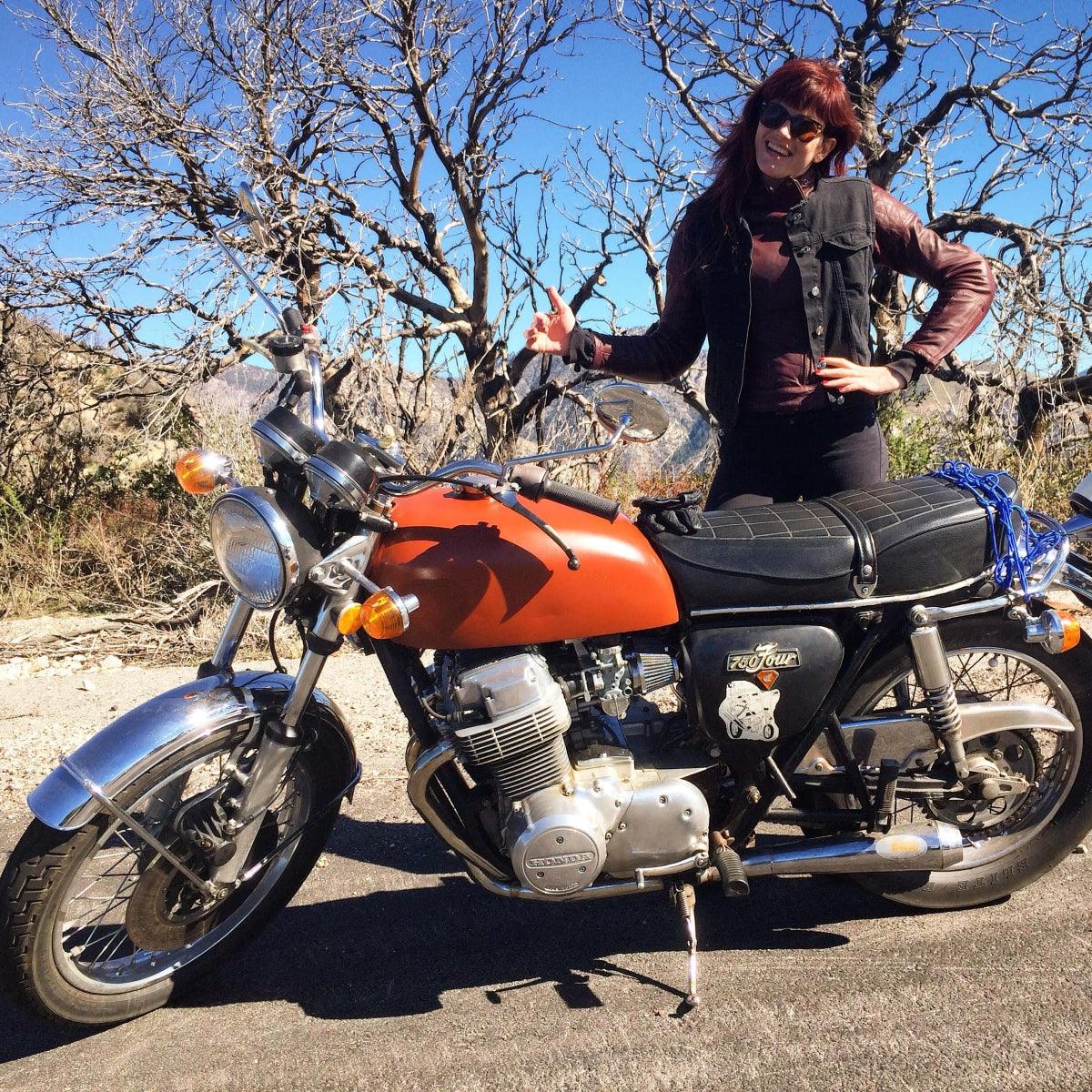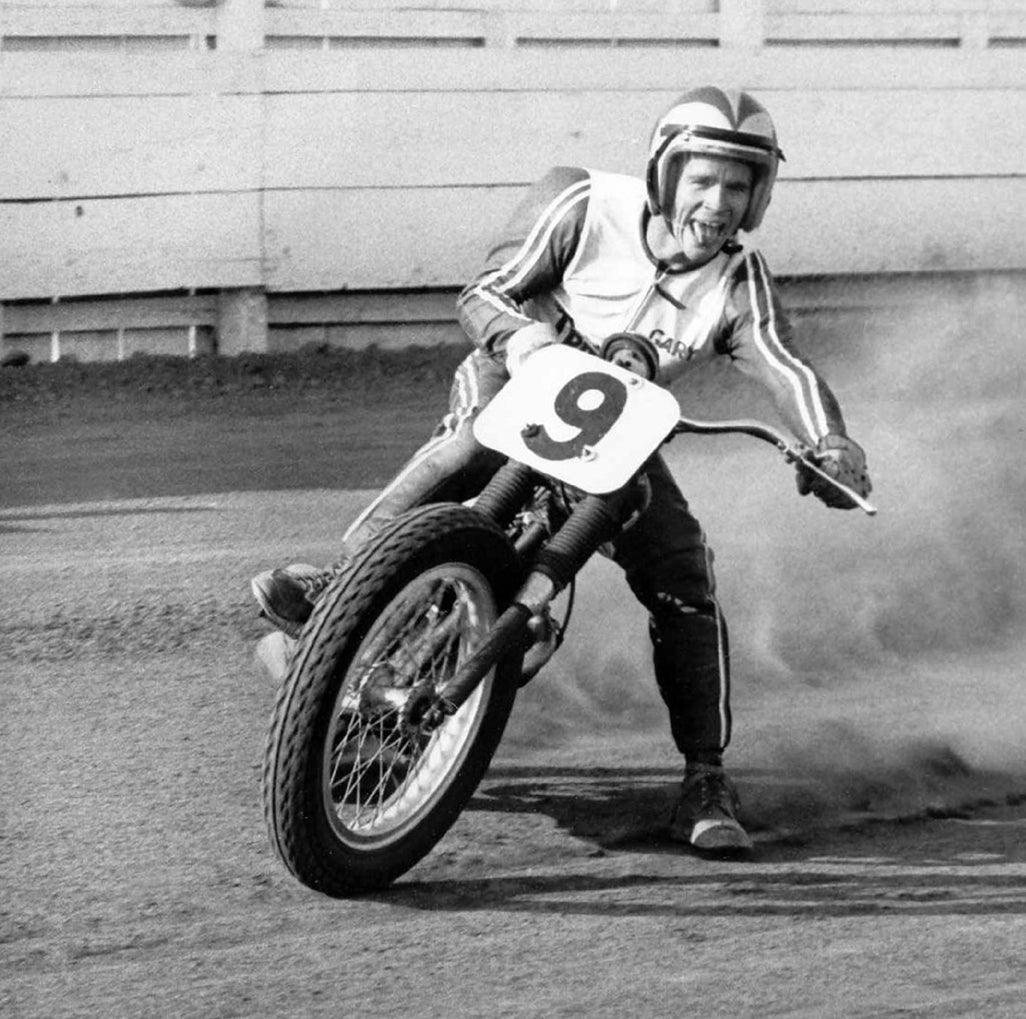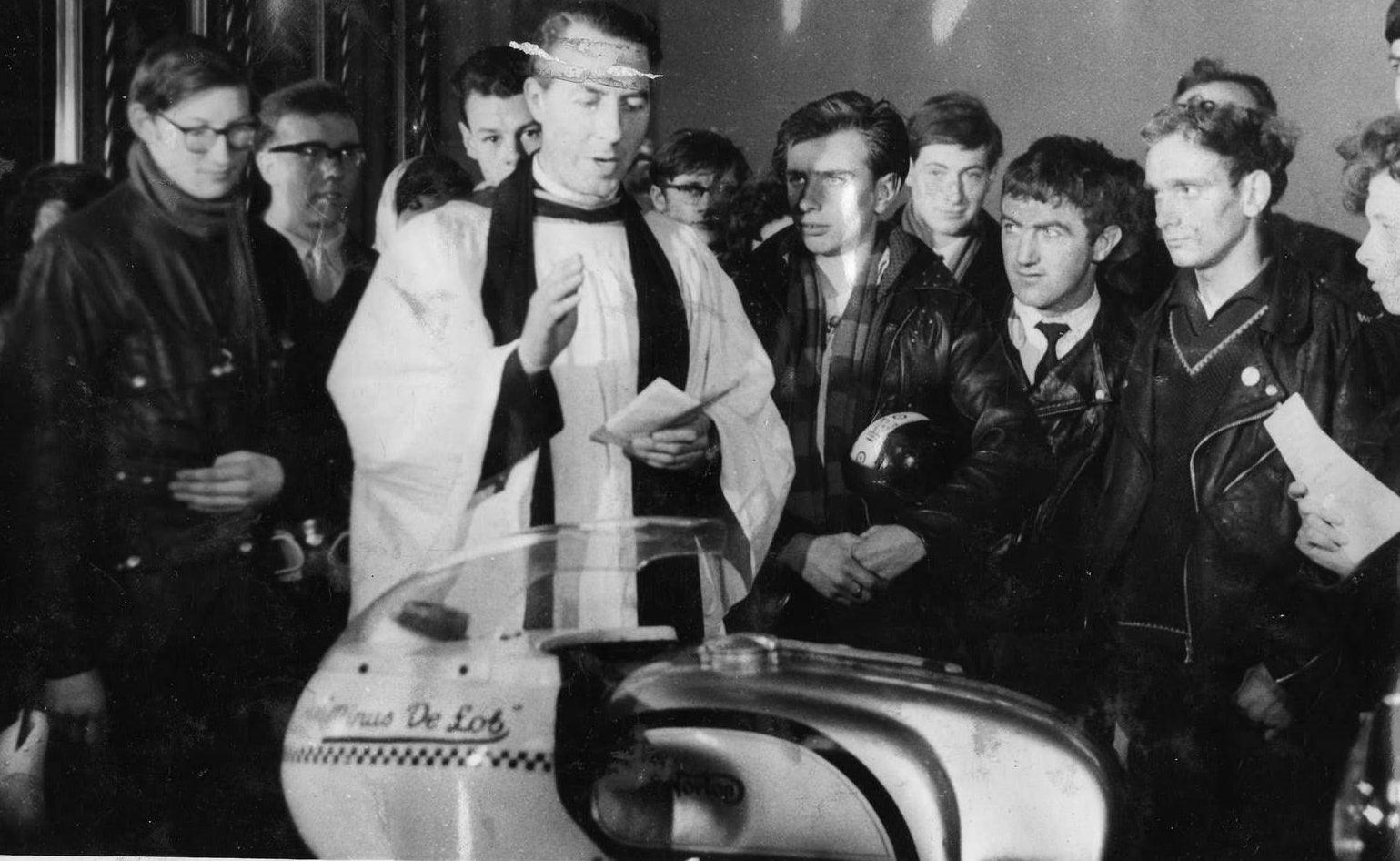
Jessie Gentry is the President and Co-Founder of The Velvets, an all-women’s motorcycle club based out of Los Angeles. The Velvets have a unique vision to give back to the community, hold themselves up as role models, and evangelize the good news of flat track racing. In the interview, Gentry discusses her ideas about the value of autonomy, the importance of being able to wrench on your own machine, and what it means to be a contributing member of a community.
British Customs: How did The Velvets get started?
Jessie Gentry: Lindsay Kavanaugh and I started it. We were both working at a modeling agency in LA, and I had a motorcycle, and she got a motorcycle, so we started riding together and hanging out. We hung out at the Cha Cha Lounge over in Silver Lake a lot at the time, and girls started coming over to us and talking to us when they saw us sitting at the bar with our gear while our bikes were parked out front, which is actually how we met Boyd. Our third member, Mimi, was a friend of Lindsay’s who had just moved from Texas and wanted to ride with us. From there it formed organically.

BC: How so?
JG: When we first formed, we were just friends who were doing the club thing of just riding and enjoying experiences together. People started reaching out to us who wanted to form chapters in other states, and we thought that was awesome and encouraged them to open their own clubs, but that wasn’t the path we had envisioned for The Velvets. We’re all about encouraging women to ride, and we think there’s a space for all-inclusive clubs, but we liked having our group of girls we like to ride and race with. We like to curate our community because there’s a certain type of girl that fits in with us.
Right now, there are four of us since Lindsay moved back to Texas, even though she will always be an honorary Velvet. There’s Boyd, our Star Racer; Mimi, our Treasurer; myself, the President — even though I hate that title — ; and Shirley, our Wrench Captain.
BC: The Velvets’ tagline is “Ride, Wrench, Rock, Repeat.” What does being able to wrench on your own bike mean to you?
JG: When it comes to anything mechanical, it’s important to have the autonomy to be able to fix things yourself. I come from an upbringing of working on hot rods with my dad, and it was always really exciting to me to be able to make impactful mechanical changes and be mechanically knowledgeable. Before I got into motorcycles, I had a ’66 Mustang that was my baby. I knew how to work on every part of it, and customized the whole thing. Being able to fix things myself and not having to depend on someone else became an important part of who I am. I think it’s important to be able to do things yourself in all realms of life; theres’a special satisfaction that comes from being able to fix things yourself, in particular.

Being able to fix things myself and not having to depend on someone else became an important part of who I am.
I think people are getting disconnected from things like fixing problems and finding solutions and learning how things work. Those are important aspects of being human, though. Part of enjoying anything is being curious about it and figuring it out. For motorcycles especially, it’s important to be at least a little bit mechanically in-the-know, so you can at least do your basic maintenance and upkeep, and to know when to take your bike to a professional. I have to give a shout-out to Charlie’s Place in Burbank for that.
BC: Why are you so passionate about vintage bikes?
JG: Well, funny thing: the first bike I ever rode was an R1. I used to ride around on back with a guy I dated, but it always seemed unreasonably uncomfortable. Little did I know that the jerk had actually removed the passenger pegs, forcing me to basically do squats the entire time we were two-up. I had ridden around on the back of dirt bikes in Yosemite as a kid, but I had never been the pilot before. I got to try riding the R1 myself, but the bike never really did it for me.

I grew up with my dad being really into motorcycles, but we always had hot rods. We used to go to Pro Italia and he really tried to get me into bikes, especially Harleys and Ducatis. I looked at bikes for years, but always wished I had a guide to picking which one would be best for me. Then I started noticing vintage bikes. Specifically old Hondas, because they came with a tool kit, and that’s what sold me on them. Not only were they cute, vintage, and had my dream aesthetic, but they encouraged autonomy because they were designed to be worked on by their owners. I was attracted to that part of it: I wanted to learn how to work on it. I still have the tool kit and the bike.
BC: What does the motorcycle community mean to you?
JG: I think that anyone involved in the motorcycle community feels that it’s a very unique community. But I wonder if that’s because it’s like, we’re all a little screwy and have to band together, or if it’s the love for motorcycles that brings us all together. It’s like when you’re riding down the street and everyone throws the peace sign to each other, or whatever their personal wave is, regardless of what kind of bike you’re on. Everyone is excited to be a part of the same culture. I think that’s just part of the community.
BC: What does it mean to you to have your own community, The Velvets, within the greater community?
JG: It’s a fun thing to have a group of people that will always have your back, and who will always look out for your best interest. We’ve been supporting a lot of women through charity events and the local Hell on Wheels races, and we got a lot of girls to go out there and race. I think the true goal of a motorcycle club is to be an asset to the community and its members: I think it’s important that we act as positive role models, and that we encourage girls to try new things on motorcycles.
BC: The Velvets have always been focused on giving back by hosting a variety of events to raise awareness and donations for a number of charities and organizations, from rodeos to group rides. What are your thoughts on the importance of giving back?

I think the true goal of a motorcycle club is to be an asset to the community and its members.
JG: Giving back has always been a part of motorcycle culture and its history. You see it everywhere. Every MC has the thing they want to support, whether it’s the older 1%er clubs supporting veterans or us raising donations for the Downtown Women’s Center in LA. MCs have always been focused on charity and community, and being an asset to their community. If you’re going to party, why not party for the sake of making money for an awesome charity?
We try to have fun with it. When we contacted the Downtown Women’s Center and asked them what they said they needed, they told us they needed panties. So we did a panty drive and found an electric bull and had a charity rodeo. It was so much fun, and it was so good. It was an excellent opportunity for giving back, and especially as a way to give back using our social clout.
We want to support things like Hell on Wheels and local amateur dirt track events to the end of the earth because they’re amazing. If they weren’t there, there would be a huge hole in the community.

BC: What sort of opportunities and experiences open up to you when you join a motorcycle club?
JG: It’s hard to differentiate the experiences you would get from being in our club versus having a super close-knit group of friends who would support you, because different groups of people are going to pursue different experiences. We have a unique opportunity to be role models: we’re big on gear, and always make sure every picture we post has us wearing ear. I think it’s an interesting opportunity because there’s a power behind visual communication; in our position, we have a responsibility to be a benefit to our community.
BC: The Velvets are pretty involved in dirt track racing, especially flat track. How did you get involved with that?
JG: Boyd, Mimi, and I went to Rich Oliver’s Mystery School to learn how to race, where we did one day of flat tracking and one day of MX skills. And then we started participating in the Hell on Wheels flat track races. After our first race, some old timer found us and told us he thought we were awesome, and offered to let us practice on a private track that he had on his ranch. Right now, we’re really interested in building a tracker to get more serious about it.
I haven’t been in that many races, but I love it. It’s the most fun parts of riding: turning left, and going straight really fast.




Leave a comment
All comments are moderated before being published.
This site is protected by hCaptcha and the hCaptcha Privacy Policy and Terms of Service apply.